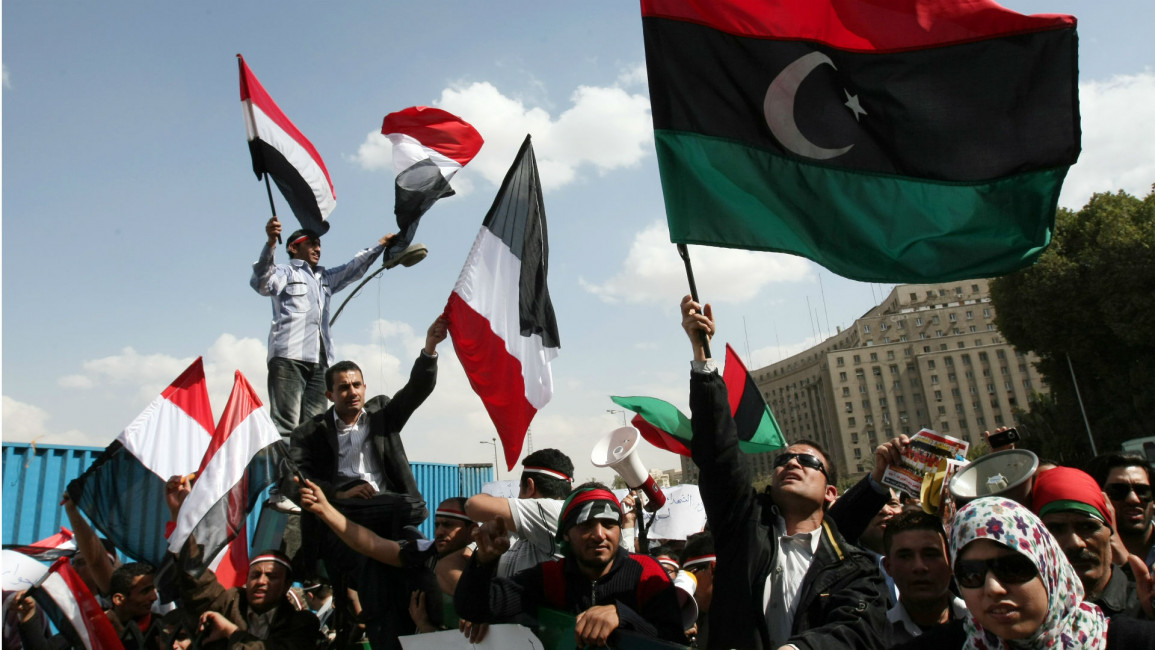
To what end an Arab force?
It is clear that a joint Arab force is being planned but we are still no clearer to understanding what shape this force will take, or how it will be run.
What can be said is that the command structure will include different Arab states that have different forms of government.
Securing the region
Certain Arab regimes not only lack democratic credentials, but also the military know-how to make this force work.
They also have militaries that would be unwilling, or incapable, of crafting democracies or assisting the democratisation process in the region.
Due to the inglorious human rights records of some of these regimes, humanitarian intervention by the joint Arab force can also be ruled out. None of the official statements seem to suggest that this was ever a primary objective of the force anyway.
Instead, security and stability in the region would be considered the guiding principles of this force – by this, we mean the process of identifying common threats and ways of confronting them.
| The outcome of past Arab-led military interventions could not be more different than the West-led ones. |
This could take the form of a classic "balance of power/terror" approach, which would mean undermining the power of a group to force it into negotiations.
That would mean that the party would be forced into a compromise under the dictates of the powers that intervene in the conflict.
The outcome of past Arab-led military interventions will probably be far different than the Western-led ones in Bosnia, Kosovo and Libya, where either an immediate or a potential humanitarian disaster was dealt with or a post-conflict democratisation process was initiated.
Arab intervention forces have always been driven by the objective of empowering proxy political forces rather than prevent humanitarian disasters unfolding.
There has been no effort by these powers to address underlying tensions that might help resolve the crisis and establish a lasting peace.
History of failures
The Egyptian military intervention in Yemen and the Arab Deterrence Force (ADF) in Lebanon are tragic reminders of this.
Egypt's president Gamal Abdel Nasser sent 70,000 of his troops to Yemen to support a republican coup against its royalist rivals.
But Cairo's legitimacy as an intervening force was lost when it pounded Yemeni guerrillas with prohibited chemical weapons – a first in an intra-Arab conflict.
It then lost face when the United Nations General Assembly condemned Egypt's use of these weapons, and was further handicapped by failing to meet its promises on developing Yemen.
The costs for Egypt were not limited to moral or reputational damages and a military humiliation. By 1965, Egypt had run up a foreign debt of nearly $3 billion.
This forced authorities to add a "defence tax" on all sales in the country to finance the Yemen war. This was to take its toll on Egypt's economy.
The ADF intervention in the Lebanese civil war, led primarily by Syria, did not fare any better.
Not only did it fail to put an end to a brutal conflict, but it was also unsuccessful in providing security to Lebanon's vulnerable Palestinian refugee population.
The ADF ultimately become a "side" in the protracted civil conflict and particularly in 1982, when the Lebanese government failed to extend its mandate.
It became clear that this intervention force was essentially a tool of Hafez al-Assad's regime and committed some of the worst atrocities against Palestinians during the civil war, particularly during the so-called "War of the Camps" starting in 1985.
Brief and less complex intervention projects were also unsuccessful in ending violent crises in the region, and in some cases they had the opposite effect than what was intended.
A clear example of this is a series of airstrikes launched by Egypt in Libya.
Error in judgement
This has not only undermined the UN-led peace process in Libya, but have also empowered "eradicationist" factions who oppose any form of negotiations with the enemy.
This has in turn provided propaganda material for extremist forces on a different side in the multi-party civil war.
Historical patterns, of course, can be interrupted and radically altered, but for that to happen some of the structural deficiencies of Arab interventions need to be addressed.
Clear national security policies need to be established, along with balanced civil-military relations ans proper training for Arab forces in peacekeeping and peace-building.
A deeply ingrained military-political culture in some Arab countries, along with socio-psychological complexities, can affect the outcome of military intervention in a civil war - particularly if this includes a ground offensive.
These are critical points that need to be addressed to avoid the continued failure of Arab military intervention.




